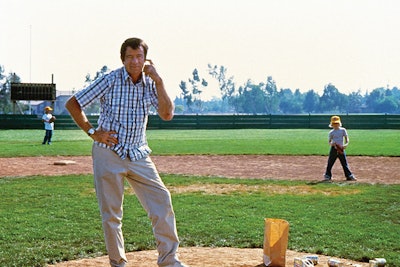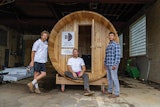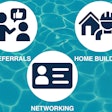
Every wonder why screenwriter Bill Lancaster chose to make Morris Buttermaker, his boozy, disreputable Little League coach [Bad News Bears, 1976], a pool guy? Well, he didn’t want the character to be a homeless person — the man needed an income — but at the same time, the writer wanted to show the audience his main character had hit rock bottom.
Are you mad yet? Good!
But don’t take it out on Lancaster. It’s not like he birthed the stigma. This was already the American public’s perception of the folks in our net- wielding profession. The problem is that it contains some truth. I mean, think about it. What percentage of your competition in your market exudes professionalism?
Now consider that, according to IBISWorld, as of 2023, there are 72,302 swimming pool cleaning service businesses in the United States. That’s just companies! How many employees do you think each of these have? If you estimate that 50% of the service companies in your market act professionally, and we expand that ratio across the nation, that gives us over 36,000 pool service businesses (we know of) that are unprofessional and perpetuate a stain on our reputation.
True story: I was attending a black-tie event for a private school. Standing at one of those round bar-height tables, a woman approached me and introduced herself. She was a teacher at the school that was hosting the soiree. The 30-something asked what I did for a living. I proudly stated that I own a swimming pool service company. I’ll never forget her response, “Oh, that’s so nice. I guess some people shouldn’t really go to college, should they?”
This job has always been an attractive start-up for the wannabe entrepreneur. The start-up cost is low, the hours can be malleable, and there are people who look at a few YouTube videos and think, “How hard can it be?”
Honestly, and you know this is true, we work in an industry where any clueless SOB with Google Goggles on can wake up one morning, buy a pole, and poof — they are out there cleaning pools in their Sanford & Son hooptie banger, sporting a torn Taylor Swift Tee and blasting Cardi B.
On top of that, recent spikes in pricing have made it more challenging for some to maintain their desired level of professionalism within their own service company. The cost of product has begun to whittle away at the availability of payroll dollars, leaving some in a position where they cannot compete with $18-an-hour burrito roller positions at Chipotle. How do you hire qualified and professional team members when you cannot afford to pay them what they’re worth?
It’s easy to say, raise your rates, raise your rates, raise your rates, but the reality is that homeowners do have a max they are willing to pay. And they will only endure so many price increases during a season. Trust me — I’m a massive proponent of charging ‘as much as you can,’ but truth be told, ‘as much as you can’ does have a threshold.
SO, THERE IT IS. NOW, WHAT THE FLOC CAN WE, AS AN INDUSTRY, DO ABOUT IT?
How do you turn an industry of pool guys and pool gals into an industry of Pool Professionals? I’ve considered universal licensing, but I believe that action would only generate a hoard of illegal pool cleaners. Cutting them off at distribution will send them shopping at Amazon, further feeding our e-commerce concerns. The harder we press and restrict, the more I think we will work against ourselves.
I’ve put a lot of thought into how to raise the bar in this industry. I’m not lying when I say I feel like Doctor Strange (Avengers: Infinity War), where I look into the future 14,000,605 times to see the outcome of every possible scenario, and an awful lot of them are disappointing. To me, there is only one scenario in which we beat Thanos (unprofessionalism):
Mentoring. Apprenticeship. Person to person.
The industry has come a long way from its early ideas that knowledge is the secret sauce that should always be locked up tight within the company walls for fear of breeding competition. Information sharing is more commonplace, and the industry is ripe for a significant evolution. I’m not telling anyone to give away the farm, but maybe we could share just enough to increase the value of farming across the board, including our own. Sometimes, just sometimes, perhaps sharing some of that oh-so-precious wisdom with the outside world might do some good and, over time, aid in elevating the worth of an industry.
We must continue to evolve into an industry in which the successful growth of the profession becomes a shared, common value. Like the medical profession. Like, to a large extent, the other, larger trades.
I’ve always said and genuinely believe that the most incredible thing anyone can do for this industry is take on the mentor role. But it won’t work unless the Pros care enough to step up and do something about it. You can’t just throw it out there, either. If you want to change the industry’s professionalism level, you have to start with your market and play an active part. You must approach people and offer to take them under your wing.
If you are scoffing at my suggestion, it’s okay; you’re not there yet. I’m not asking anyone to go door-to-door like an encyclopedia salesperson. Still, if you see someone at the distributor acting less than professional, there’s no reason you can’t say hi, and just show them by your actions the right way to go about the job.
Suppose you want to help but aren’t sure about being a mentor. Start small; you can actively recruit for your trade association — whether or not you belong to one, you know the associations are pushing the industry in the right direction. And now PHTA has launched new apprenticeship programs; you could get someone signed up. Or your action could be as simple as inviting someone to tag along with you at the next trade show and attend classes in education. Just a little effort can go a long, long way.
I agree, it is not our responsibility, but something in the system has failed. Something has to be done about it. Allowing ‘Quadruple-U (uninsured, unlicensed, uneducated and undercutting) Pool Cleaning’ to survive is allowing cancer to spread. The only way I can see to rid the industry of the tumors is to educate them.












































